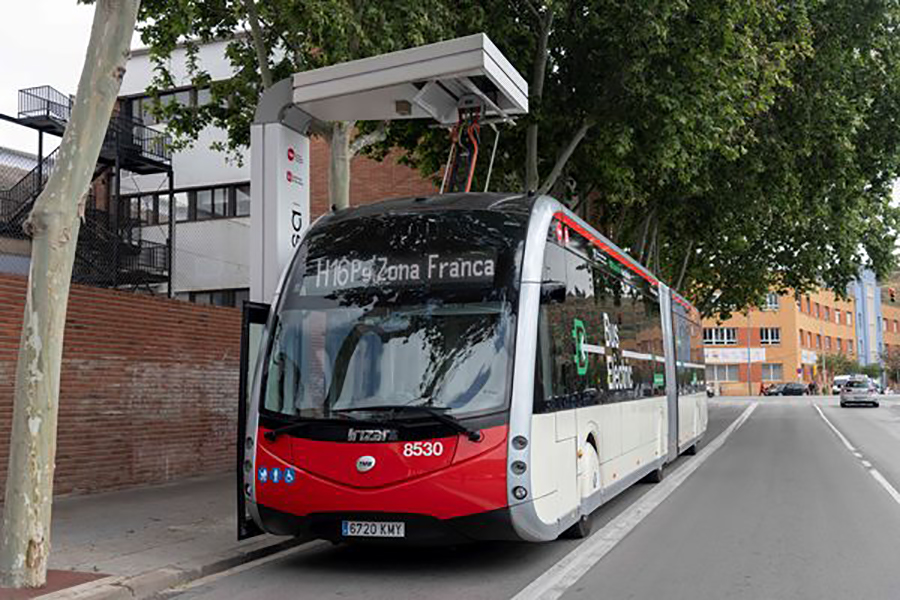Barcelona plans to replenish the bus fleet with 100% clean vehicles
TMB has committed to ensure that, in the next four years, 100% of new vehicles added to the fleet (410 units) will be clean vehicles, and 62% of these will be zero-emissions vehicles. This percentage goes beyond the European guidelines, which establish quotas of 45% and 22.5% respectively.

A monographic conference with the title “TMB’s Commitment to Green Energy”, setting out the roadmap to improve the environmental quality of Barcelona’s bus fleet, which involves purchasing 210 battery electric vehicles, 46 hydrogen vehicles and 154 gas hybrid vehicles between 2021 and 2024, was held this morning.
This means that, in the next four years, 100% of new additions to the fleet (410 units) will be clean vehicles, and 62% of these will be zero-emission vehicles. This goes beyond the European guidelines, which establish quotas of 45% and 22.5% respectively.
Transports Metropolitans de Barcelona (TMB) is promoting an innovative project to use the electric energy from the metro system to supply power to buses, with savings of up to 30%, because decarbonising public transport and bringing the climate crisis under control requires the efficient electrification of the bus fleet, which includes careful planning of charging infrastructures both in bus depots and on the street.
The first bus lines in Barcelona to be electrified, in 2021, will be three of the most important lines in the mainline bus network: The no. H16 bus line (32% of which is already made up of articulated electric vehicles) and the H12 and V15 bus lines. Over half the fleet will be electrically powered by 2030.
The conference, which was held online, was opened by TMB President Rosa Alarcón, and the main presentation was given by TMB Managing Director Gerardo Lertxundi and by the director of the Barcelona Bus network, Jacobo Kalitovics.
Hydrogen Cells
At the same time, TMB has started using hydrogen cells, also with zero emissions, having concluded contracts for eight standard units and following the award of a contract for the supply of green hydrogen by means of a plant that will be built this coming year in the Zona Franca industrial area. This will be the first plant of this type for public use in Spain.
TMB’s adoption of hydrogen is backed by the European JIVE 2 programme promoting fuel-cell and zero-emission vehicles, which is co-funded by the European Union.
Finally, the third path towards reducing emissions from the Barcelona bus network is the adoption of biogas, a green energy that is being promoted by TMB through its involvement in research projects such as LIFE Nimbus, a project to turn sludge from treatment plants into fuel. In the meantime, all new gas buses purchased since 2019 are hybrids, leading to significant savings in both consumption and emissions.
In fact, Barcelona’s buses are currently leaders in Europe due to their low emissions of gas and harmful particles, following previous environmental repurposing initiatives resulting in 63.3% of the 1,157 units running on compressed natural gas, hybrid or electric engines.
Public policies
During the first session, public policies for the promotion of renewable energies were explained by Rosa Alarcón, President of TMB and Councillor for Mobility of Barcelona City Council; Teresa Ribera, Fourth Vice-President of the Spanish Government and Spanish Minister for Environmental Transition and the Demographic Challenge; and Damià Calvet, Minister of Territory and Sustainability of the Generalitat de Catalunya.
In the final part, a round table entitled Clean energy in public transport: innovation and knowledge was held. The participants were Noshim Omar, CEO and founder of ABBA; Umberto Guida, Director of Knowledge and Innovation at UITP; and Freddy Bergsma, Senior Manager of the Business Strategy Division of Toyota Motor Europe. Josep Maria Armengol, Director of the Area for Bus Technology, acted as moderator.
The conference was organised by TMB in partnership with the International Association of Public Transport (UITP) and the Association of Urban Collective Transport Management Companies (ATUC).
You can watch the video of the event in full here.



